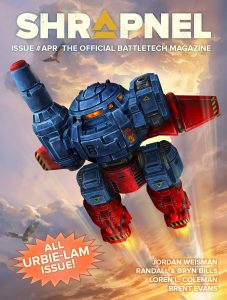Difference between revisions of "Swarm LRM"
| Line 6: | Line 6: | ||
Built along similar lines as its [[Thunder LRM]] counterpart, each Swarm LRM missile contains 100 sub munitions which separate when the missile reaches its target area. Those missiles that miss the intended target then attempt to home in and strike at any adjacent targets, helping to break up enemy formations. Ignoring its higher cost, the Swarm missile never became more than a specialty loadout because the missiles, like artillery, indiscriminately target any nearby unit, whether friend or foe. | Built along similar lines as its [[Thunder LRM]] counterpart, each Swarm LRM missile contains 100 sub munitions which separate when the missile reaches its target area. Those missiles that miss the intended target then attempt to home in and strike at any adjacent targets, helping to break up enemy formations. Ignoring its higher cost, the Swarm missile never became more than a specialty loadout because the missiles, like artillery, indiscriminately target any nearby unit, whether friend or foe. | ||
| − | Swarm LRMs fell out of favor among the [[Successor State]] militaries as the technological decline of the [[Succession Wars]] forced 'Mech combat into shorter and shorter ranges, increasing the odds of friendly fire strikes, before the technology itself was ultimately lost in [[2833]]. Swarm LRMs were another technology retained by the [[Clans]], who used it leverage their range advantage and preference for avoiding close range combat to great effect. Inspired by having it used against them, the [[Federated Commonwealth]]'s [[New Avalon Institute of Science]] reintroduced the standard Swarm LRM to the [[Inner Sphere]], while the [[Free Worlds League]] worked at overcoming their indiscriminate nature by adding an IFF (Identity Friend or Foe) detector to the missiles, producing the so-called [[Swarm-I LRM|Swarm-I]]. | + | Swarm LRMs fell out of favor among the [[Successor State]] militaries as the technological decline of the [[Succession Wars]] forced 'Mech combat into shorter and shorter ranges, increasing the odds of friendly fire strikes, before the technology itself was ultimately lost in [[2833]]. Swarm LRMs were another technology retained by the [[Clans]], who used it to leverage their range advantage and preference for avoiding close range combat to great effect. Inspired by having it used against them, the [[Federated Commonwealth]]'s [[New Avalon Institute of Science]] reintroduced the standard Swarm LRM to the [[Inner Sphere]], while the [[Free Worlds League]] worked at overcoming their indiscriminate nature by adding an IFF (Identity Friend or Foe) detector to the missiles, producing the so-called [[Swarm-I LRM|Swarm-I]]. |
==References== | ==References== | ||
Revision as of 07:12, 25 January 2014
Swarm LRMs are an alternate Long Range Missile type.
Description
The Swarm missile was developed in 2621 as part of an attempt by the Terran Hegemony to replace fragile and sluggish standard artillery pieces with more sturdy and mobile BattleMechs with specialized LRMs. The Swarm missile was intended to recreate the splash damage ability of artillery shells.
Built along similar lines as its Thunder LRM counterpart, each Swarm LRM missile contains 100 sub munitions which separate when the missile reaches its target area. Those missiles that miss the intended target then attempt to home in and strike at any adjacent targets, helping to break up enemy formations. Ignoring its higher cost, the Swarm missile never became more than a specialty loadout because the missiles, like artillery, indiscriminately target any nearby unit, whether friend or foe.
Swarm LRMs fell out of favor among the Successor State militaries as the technological decline of the Succession Wars forced 'Mech combat into shorter and shorter ranges, increasing the odds of friendly fire strikes, before the technology itself was ultimately lost in 2833. Swarm LRMs were another technology retained by the Clans, who used it to leverage their range advantage and preference for avoiding close range combat to great effect. Inspired by having it used against them, the Federated Commonwealth's New Avalon Institute of Science reintroduced the standard Swarm LRM to the Inner Sphere, while the Free Worlds League worked at overcoming their indiscriminate nature by adding an IFF (Identity Friend or Foe) detector to the missiles, producing the so-called Swarm-I.
References
- Field Manual: Free Worlds League, p. 137
- Technical Readout: 2750, pp. 9, 40


